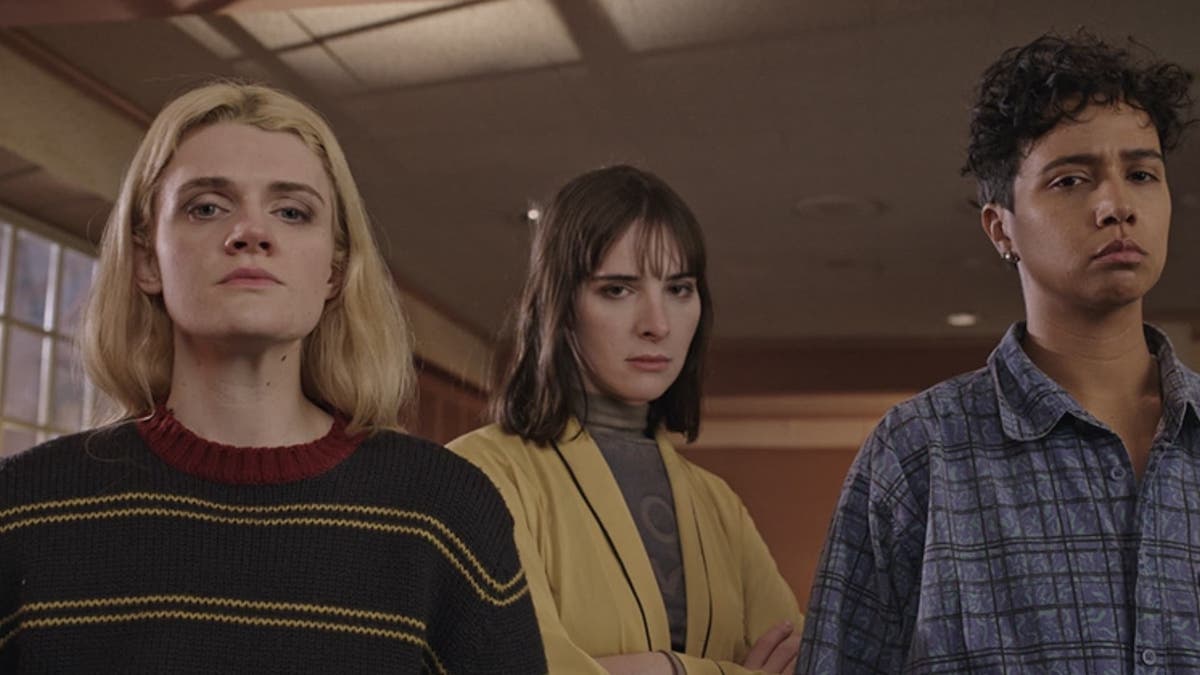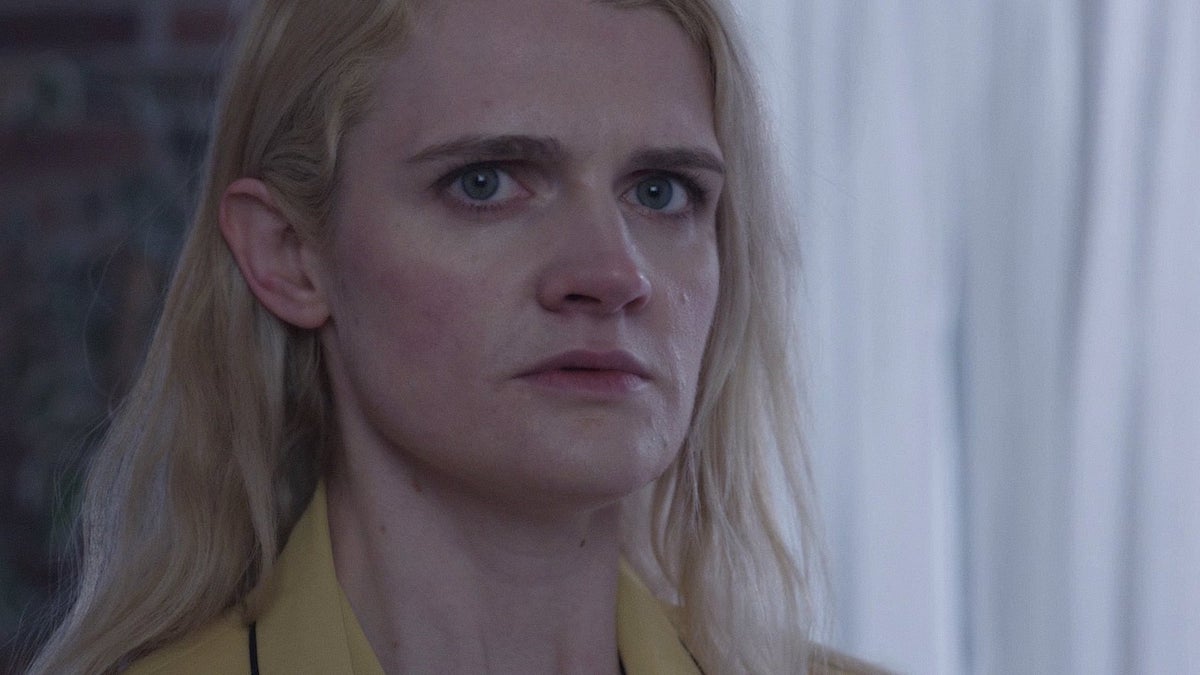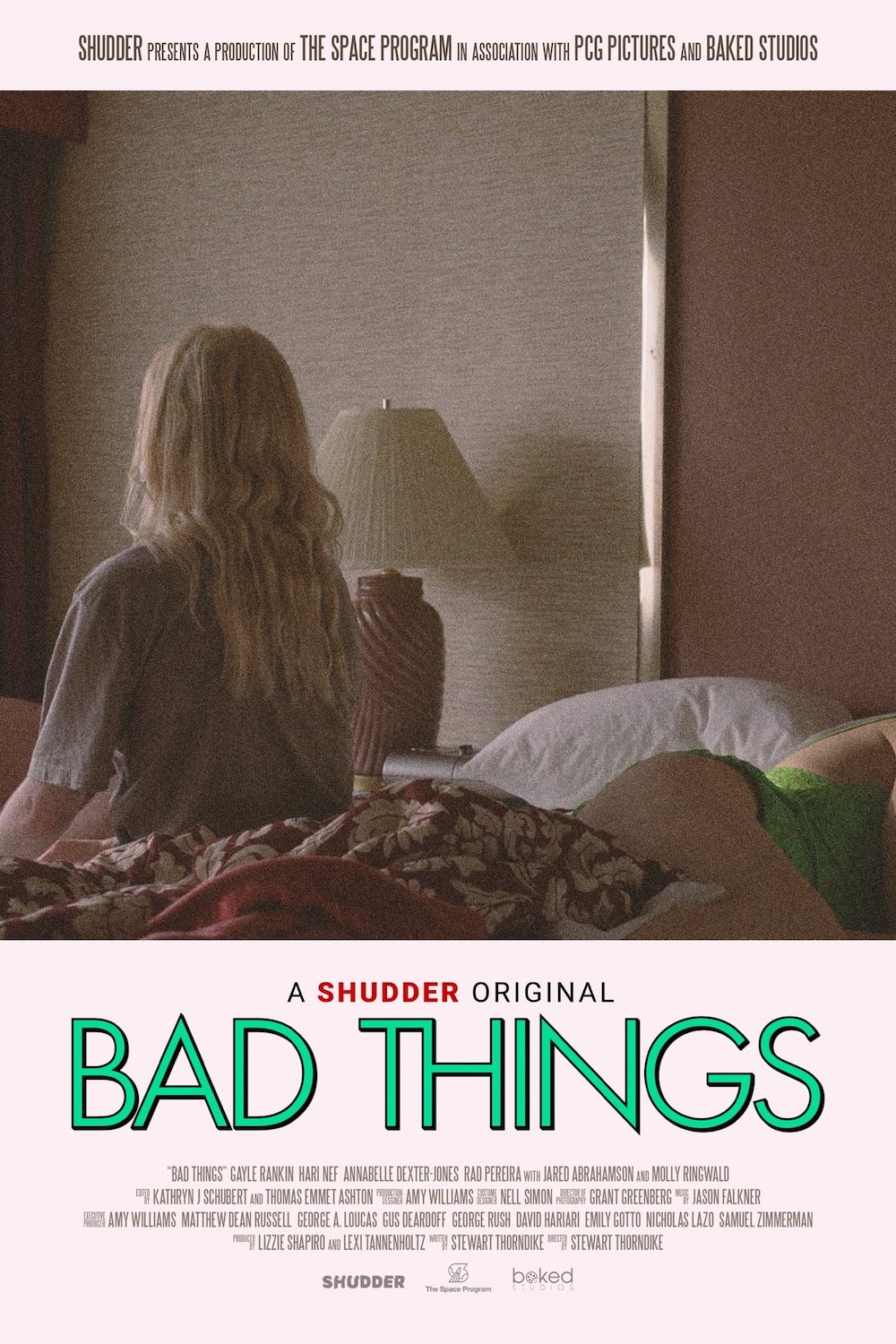BAD THINGS (2023)
A weekend getaway for a few girlfriends at a snowy hotel becomes a psychological tailspin and bloody nightmare.

A weekend getaway for a few girlfriends at a snowy hotel becomes a psychological tailspin and bloody nightmare.


Blatant references to Stanley Kubrick’s The Shining (1980) permeate Bad Things, Stewart Thorndike’s second feature after her critically applauded debut Lyle (2014). But it’s imagery from another legendary horror movie that provides both the opening and the close: Tobe Hooper’s The Texas Chain Saw Massacre (1974).
And if our first view of Ruthie (Gayle Rankin) walking across the snow wielding a chainsaw turns out to be a not very surprising gag—she just needs to cut a tree branch—it’s equally no surprise that when the object returns later the context is more sinister. After all, given the overdose of Shining allusions, no viewer of Bad Things is going to expect all to end well for Ruthie and her three friends when they decide to stay the weekend at an empty hotel.
Yet Bad Things actually has much less in common with The Shining than these references might suggest, and witty as some of them are—tracking shots down endless corridors, a deserted bar, foreboding elevator doors, a bathroom, repeated text messages saying exactly the same thing (a la the typed manuscript in Kubrick’s classic)—they risk becoming a distraction.
After all, the hotel itself isn’t really a character here, let alone a malevolent one; early comments about past deaths on its premises go nowhere, although they do provide an opportunity for some unsettling shots of joggers outside, who could be ghosts or could (more likely) be imagined, and who vaguely recall the twin girls from The Shining.

Unlike The Shining’s Overlook Hotel secluded in the Colorado Rockies, the Comley Suites appears to be adjacent to a suburban strip mall, and it’s either an awkward plot hole or a commentary on contemporary mistrust that none of the characters thinks to go there to get help.
“Think of a hotel as not just a space… but an experience,” says a hospitality guru (Molly Ringwald) in a video Ruthie watches obsessively, and which as the film goes on becomes less and less plausible even as inspirational management drivel. (Even its title, Methods in Hospitality, doesn’t quite ring true).
But rather than the hotel itself, the root of Bad Things‘ threats to Ruthie, her partner Cal (Hari Nef), Maddie (Rad Pereira), and her partner Fran (Annabelle Dexter-Jones), lies firmly in mental disturbance and childhood trauma.
Ruthie’s inherited the hotel from her grandmother, whose death has also brought her back in touch with her mother, with whom she’d been estranged for years. Now Ruthie wants to sell the property, though Cal is urging her to keep it, and a past fling between Ruthie and Fran is also causing tensions between the couple. Indeed, Fran doesn’t seem to be very popular with any of the group, and as strange sights and experiences around the hotel start to disconcert them, she seems to be the one coming closest to breaking down.
Dexter-Jones, as Fran, has the most scenery-chewing of the four key parts, but she doesn’t overdo it. At first, she comes across as both supercilious and threatening, but that seems to be a role the character herself is playing, and when the others accuse her behind her back of being a fantasist (about her own family or her recent cancer scare) we realise she may be deeply vulnerable too. Nef as Cal (recently seen as ‘Dr Barbie’ in Greta Gerwig’s Barbie) is equally characterful, while Rankin as Ruthie takes a mostly restrained approach to a character with her own troubles.
Pereira, as Maddie, is the quietest of the four but is also key to the credibility of the group. Indeed, you might sometimes get the impression there’s a more interesting movie to be made just about them, without any horror elements. Still, though Bad Things doesn’t do much more than scratch the surface of the interpersonal dynamics and tensions, they’re well-handled as far as they go.

In a cast almost entirely female or non-binary, Ringwald in her small but vitally important role, and Jared Abrahamson as the hotel’s handyman, have the only other sizeable parts.
The messy, emotionally charged relationships of the four central women are complemented by clean, calm, unflashy, almost clinical camerawork from cinematographer Grant Greenberg. Some fast-tracking shots along those Shining corridors are almost the only show-off moments. There’s soporific, pastel production design from Amy Williams, and Jason Falkner’s music score, though often pushed aside by other tunes on the soundtrack, also benefits from restraint.
As, indeed, does the horror itself. Whether there’s anything supernatural at all in Bad Things is left open to interpretation. A sudden excursion into slasher territory, nearly an hour in, doesn’t last long. Instead, what Thorndike often relies upon—and what works most effectively—is a persistent sense of unease and unreality: from automatic doors inexplicably opening and closing, to a brief, jarringly unexpected scene where the closed hotel seems to be full of guests (more Shining), and a very creepy, dread-infused scene at a railway station, virtually the only point where Bad Things leaves the hotel.
Eventually, things get to the point where we realise a key character must be hallucinating far more than we’d initially suspected, but even then the lines between what’s real and what’s not remain blurry.
A lot of this is done successfully and stylishly. Thorndike doesn’t completely pull it off, however. The film falls short of its apparent ambitions by never quite achieving the intensity or relentlessness that would allow us to share these character’s nightmares, rather than simply witnessing them. Abrupt, not quite convincing shifts—both in mood and in people’s attitudes–don’t help, and nor does the temptation to think more about The Shining than about the plight of Ruthie, Cal, Fran, and Maddie.
Still, while unlikely to displace Kubrick’s seminal movie in the horror film canon, Bad Things is a cut above most streaming horror. Strong performances and filmmaking techniques create many individually powerful and unnerving scenes, even if they don’t come together into a disturbing whole.
USA | 2023 | 83 MINUTES | 1.85:1 | COLOUR | ENGLISH


writer & director: Stewart Thorndike.
starring: Gayle Rankin, Hari Nef, Annabelle Dexter-Jones, Rad Pereira & Molly Ringwald.
